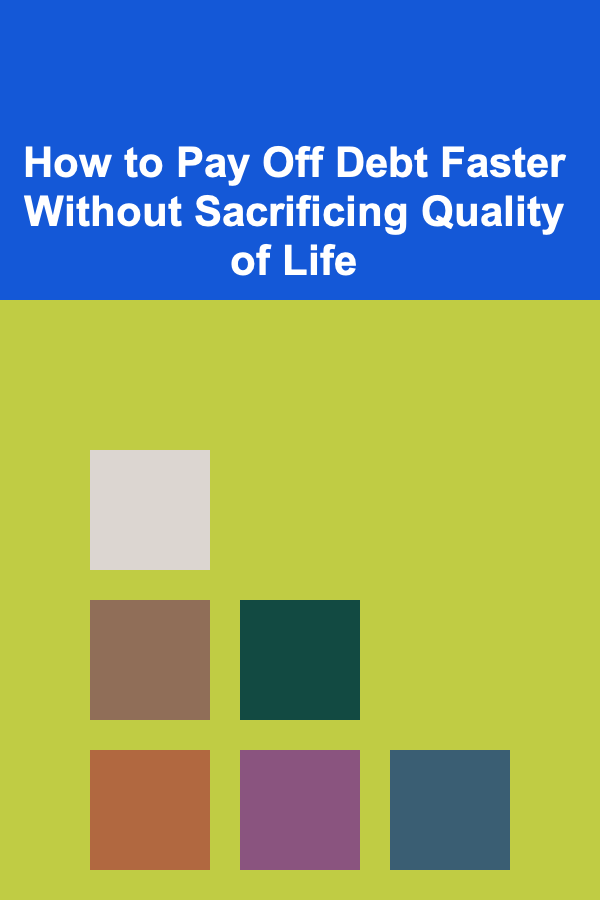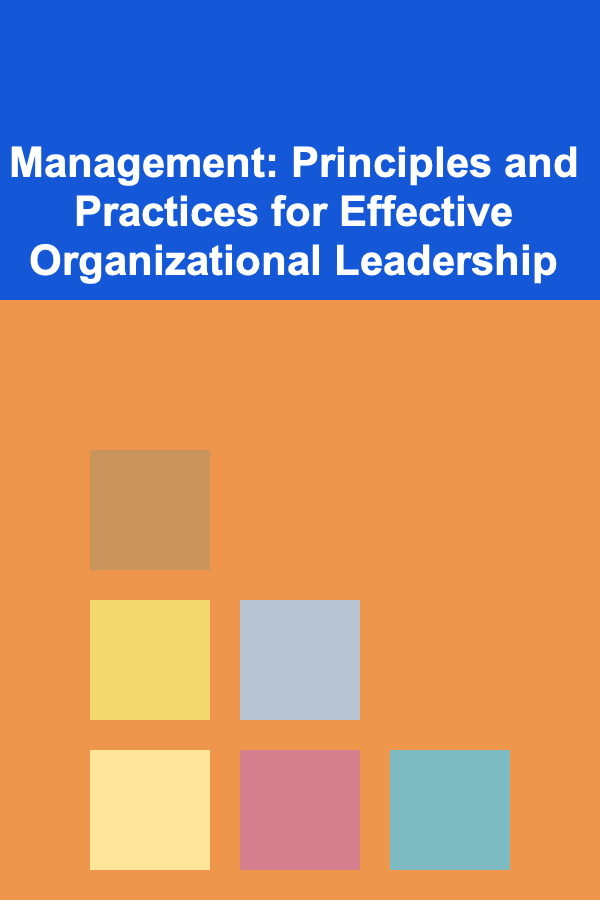
How to Pay Off Debt Faster Without Sacrificing Quality of Life
ebook include PDF & Audio bundle (Micro Guide)
$12.99$7.99
Limited Time Offer! Order within the next:

Debt can feel like a heavy burden, dragging you down both financially and emotionally. It's common for people to feel overwhelmed by monthly payments, interest charges, and the constant worry that their financial freedom is far out of reach. While paying off debt is a crucial step towards financial freedom, the idea of sacrificing your quality of life to accelerate this process can be intimidating and unappealing. Fortunately, there are strategies to pay off debt faster without cutting out the things that bring you joy and fulfillment. In this guide, we'll explore effective techniques that balance the need to eliminate debt while maintaining a reasonable lifestyle.
Understanding Debt: The First Step to Freedom
Before diving into the solutions, it's essential to understand the nature of your debt. Debt comes in many forms, each with its unique characteristics. Whether it's credit card debt, student loans, personal loans, or mortgages, each type of debt can affect your finances in different ways.
The Impact of Debt on Your Life
Debt can feel like an invisible weight. The constant worry about monthly payments, interest, and the total amount owed can create anxiety. It can affect mental health, relationships, and overall well-being. Additionally, high-interest debt, such as credit card debt, can quickly snowball, making it seem almost impossible to pay off.
However, paying off debt is not just about cutting expenses and forgoing enjoyment. It's about smart strategies, understanding the full scope of your financial situation, and making adjustments that allow for financial progress without compromising your happiness.
Step 1: Assess Your Current Debt Situation
The first step in paying off debt faster is understanding exactly where you stand. This means taking a detailed look at each debt, including the balances, interest rates, minimum payments, and the length of time you've been paying on it. A clear understanding of your debt is crucial in developing an effective repayment plan.
List Your Debts
Create a list of all your outstanding debts. Include the following for each debt:
- Creditor's name
- Total balance
- Interest rate
- Minimum monthly payment
- Due date
- Type of debt (e.g., credit card, student loan, mortgage)
Having a clear inventory will help you prioritize which debts to pay off first, and it provides a solid foundation for the next steps.
Track Your Spending
Understanding where your money goes each month is just as important as understanding your debts. By tracking your expenses, you can identify areas where you might be overspending or areas where you can make slight adjustments to save money.
Use a budgeting app, spreadsheet, or simple pen and paper to track your expenses. Categorize your spending into necessities (such as rent, groceries, and utilities) and discretionary spending (such as dining out, entertainment, and shopping). Look for areas where small sacrifices could have a significant impact on your ability to pay down debt faster.
Step 2: Create a Plan That Prioritizes Your Financial Goals
With a clear understanding of your debts and spending habits, it's time to create a strategic plan. This plan should focus on your financial goals and outline actionable steps to get there.
Choose a Debt Repayment Strategy
There are several methods for tackling debt, each with its pros and cons. Below are two popular methods: the Debt Avalanche and the Debt Snowball method.
1. Debt Avalanche Method
The Debt Avalanche method prioritizes paying off debts with the highest interest rates first. It minimizes the amount of interest you pay over time, allowing you to pay off your debt more quickly and save money in the long run. Here's how it works:
- List your debts from the highest interest rate to the lowest.
- Make the minimum payment on all debts except the one with the highest interest rate.
- Put as much extra money as you can toward paying off the debt with the highest interest rate.
- Once the highest-interest debt is paid off, move on to the next one, repeating the process.
This method is effective in terms of saving money, but it can take longer to see progress, which may be demotivating for some people.
2. Debt Snowball Method
The Debt Snowball method focuses on paying off your smallest debts first, regardless of interest rate. The idea behind this strategy is to build momentum and motivation as you pay off smaller balances quickly. Here's how it works:
- List your debts from the smallest balance to the largest.
- Make the minimum payment on all debts except the one with the smallest balance.
- Put as much extra money as you can toward paying off the smallest debt.
- Once the smallest debt is paid off, move on to the next one.
While this method may not save as much on interest, it's psychologically motivating, and for many people, it leads to a stronger sense of accomplishment.
Reassess Your Budget
Now that you've chosen a repayment strategy, it's time to reassess your budget. Consider allocating more money toward debt repayment, but be mindful of maintaining your quality of life. Here are a few tips for managing your budget without sacrificing enjoyment:
- Cut Unnecessary Subscriptions: Review your subscriptions and memberships. Are you still using all of them? Cutting out just one or two subscriptions can free up additional funds for debt repayment.
- Save on Utilities: Be conscious of energy consumption, such as turning off lights when not in use, adjusting your thermostat, or using energy-efficient appliances.
- Cook More at Home: Dining out can be expensive. Consider cooking more meals at home to save money while still enjoying delicious food.
By optimizing your budget and eliminating excess expenses, you can free up more money for debt repayment without feeling like you're sacrificing the things that matter to you.
Step 3: Increase Your Income Without Burning Out
One of the most effective ways to pay off debt faster is to increase your income. While it's important not to overwork yourself to the point of burnout, there are many ways to generate extra income that don't require a huge time commitment or sacrifice to your well-being.
Explore Side Hustles
Side hustles can be a great way to boost your income without sacrificing your primary job or quality of life. Some options include:
- Freelancing: If you have skills in writing, graphic design, marketing, or programming, you can take on freelance projects during your free time.
- Online Tutoring or Teaching: Platforms like VIPKid or Skillshare allow you to teach subjects you're passionate about.
- Selling Unused Items: Take a look around your home for things you no longer need and sell them online through platforms like eBay, Facebook Marketplace, or Poshmark.
- Pet Sitting or Dog Walking: If you're an animal lover, pet sitting or dog walking can be a lucrative and enjoyable side hustle.
Ask for a Raise or Promotion
If you've been in your current job for a while and are performing well, it may be time to ask for a raise or seek a promotion. Even a small increase in your salary can significantly speed up your debt repayment efforts.
Start a Passive Income Stream
Investing in assets that generate passive income can help you build wealth over time. This might include things like real estate investments, stocks that pay dividends, or creating content (such as an online course, blog, or YouTube channel) that generates income with minimal effort.
By leveraging side hustles or passive income, you can significantly increase the amount of money available to pay down your debt. Just remember to balance these additional work commitments with time for self-care and relaxation.
Step 4: Use Windfalls Wisely
Every now and then, you might receive a financial windfall---whether it's a tax refund, work bonus, or gift. Instead of spending it on luxuries or unnecessary purchases, use that extra money to accelerate your debt repayment.
For example:
- Apply Windfalls to Debt: Use your tax refund or bonus to pay down the highest-interest debt you have.
- Invest in Financial Education: Consider using some of your extra funds to educate yourself further about managing money, investing, or budgeting, which can help you improve your financial literacy and make smarter choices in the future.
Windfalls can give you a significant boost in paying off debt, so it's important to resist the temptation to spend them on things that don't align with your long-term financial goals.
Step 5: Stay Motivated and Celebrate Small Wins
Paying off debt takes time, and it's easy to get discouraged if you're not seeing quick results. To keep your motivation high, focus on small wins and celebrate them along the way.
- Track Progress: Regularly check how much of your debt you've paid off. Celebrate each milestone, whether it's paying off your first credit card or eliminating a smaller loan.
- Reward Yourself: Treat yourself to something small when you reach a debt repayment milestone, but be sure it's something affordable and doesn't interfere with your budget.
- Stay Accountable: Consider sharing your debt repayment goals with a friend or family member who can offer support and hold you accountable.
By celebrating your progress and maintaining a positive mindset, you'll feel more motivated to continue making strides toward financial freedom.
Conclusion
Paying off debt is undoubtedly a challenging journey, but it doesn't have to mean sacrificing your happiness or quality of life. By taking a strategic approach to debt repayment, optimizing your budget, increasing your income, and staying motivated, you can pay off your debt faster without giving up the things that matter to you. The key is balance---making mindful adjustments to your spending, setting achievable goals, and remembering that your financial freedom is worth the effort.
With patience, discipline, and consistency, you can become debt-free while continuing to live a fulfilling life.
Reading More From Our Other Websites
- [Mindful Eating Tip 101] From Plate to Palate: How to Turn Meals Into Mindful Rituals
- [Personal Care Tips 101] How to Avoid Common Mistakes When Using Teeth Whitening Strips
- [Home Soundproofing 101] How to Soundproof Your Bedroom for Better Sleep Quality
- [Personal Investment 101] Turning Deep Learning Knowledge into a Profitable Side Hustle
- [Home Family Activity 101] How to Create a Family Storytelling Night
- [Home Party Planning 101] How to Plan an Elegant Tea Party in Your Living Room
- [Home Budget 101] How to Budget for Home Entertainment (Streaming, Gaming)
- [Stamp Making Tip 101] From Hobby to Home Décor: Designing Custom Stamps for Your Space
- [Home Storage Solution 101] How to Store Your Books and Magazines in Style
- [Home Pet Care 101] How to Keep Your Home Clean with Pets Around

How to Add Accent Lighting to Highlight Your Favorite Art Pieces
Read More
How to Create a Backyard Camping Experience for the Family
Read More
How to Create a Budget-Friendly Meal Plan for Your Family
Read More
Management: Principles and Practices for Effective Organizational Leadership
Read More
Exploring the Benefits of Hydrotherapy: A Comprehensive Guide
Read More
How to Manage Your Time and Avoid Burnout as a Professor
Read MoreOther Products

How to Add Accent Lighting to Highlight Your Favorite Art Pieces
Read More
How to Create a Backyard Camping Experience for the Family
Read More
How to Create a Budget-Friendly Meal Plan for Your Family
Read More
Management: Principles and Practices for Effective Organizational Leadership
Read More
Exploring the Benefits of Hydrotherapy: A Comprehensive Guide
Read More